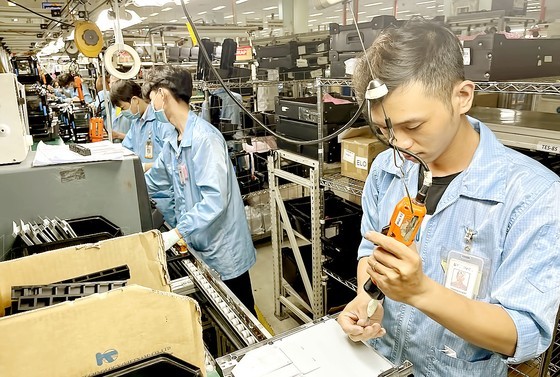 |
Workers at Datalogic factory produce electrical devices in the Saigon High-Tech Park. |
The event was graced by the presence of Mr. Phan Van Mai, Standing Deputy Secretary of the Municipal Party Committee, Chairman of the People's Committee of HCMC.
Dual challenges
During the event, many businesses shared that a widespread shortage of production orders in various sectors and industries continues to persist. Major sectors of the city, such as electronics, food and beverages, rubber, plastics, and textiles, have experienced substantial declines compared to the same period last year, with some even facing negative growth. Administrative obstacles have prevented businesses in the supporting industry sector from accessing loans through the city's stimulus lending program for the past two years. Consequently, investment-focused businesses that are unable to secure additional loans are forced to sell assets in order to sustain their operations.
Mr. Do Phuoc Tong, Chairman of the HCMC Association of Mechanical-Electrical Enterprise, has expressed that the loan application procedures are highly complex. Additionally, businesses seeking access to stimulus funds must undergo many specialized inspections conducted by relevant departments and agencies. Settling financial obligations from this support fund has become exceptionally challenging for businesses. As a result, there is a reluctance among businesses to borrow funds from the budget source.
According to Dr. Tran Du Lich, an economic expert, HCMC has hit the lowest point of the recession. HCMC-based enterprises have been experiencing the negative effects of complex administrative procedures and outdated mechanisms that are no longer suitable for a metropolis. Moreover, the city's heavy reliance on external supply chains for over 60 percent of its production materials has resulted in significant repercussions due to disruptions in the global supply chain.
Expectations on new resolutions
Dr. Tran Du Lich said that the city was prioritizing solving two significant challenges: infrastructure and institutional mechanisms. Specifically, in terms of infrastructure, there are ongoing efforts to construct Ring Road No.2 and No.3 and to upgrade the Xuyen Tam and the Tham Luong - Ben Cat- Nuoc Len canal systems. Regarding institutional mechanisms, the objective is to address management deficiencies by enhancing both the city's autonomy and that of district-level authorities, thereby eliminating the ask-give mechanism. As for the financial mechanisms, there is substantial potential for mobilizing funds outside the budget. Therefore, it is essential to improve decentralized mechanisms that encourage local autonomy and responsibility while also strengthening the role of the People's Council in facilitating prompt and appropriate policies that align with the unique developmental characteristics of the locality.
Acknowledging the contributions made by businesses, Mr. Phan Van Mai, Chairman of the People's Committee of HCMC, shared that the city has taken steps to implement the action plan for Resolution No.24 of the Politburo, focusing on the development of the Southeast region, and Resolution No.31, which aims to enhance the development of HCMC. As part of these initiatives, the city has proactively initiated the implementation of 150 projects that require the participation and investment of businesses. Notable examples include the construction of the Can Gio International Transshipment Port, the completion of seven logistic centers, internal resource support for the development of enterprises, as well as infrastructure improvements.
Specifically, if approved by the National Assembly, the new resolution replacing Resolution No.54 will bring about significant advancements in the mechanism for the city to join hands with businesses to expedite development. Mr. Phan Van Mai also urged enterprises and the city to conduct research and enhance strategies, roadmaps, and policies for transformation and green development which will be integrated into the stimulus program.
























